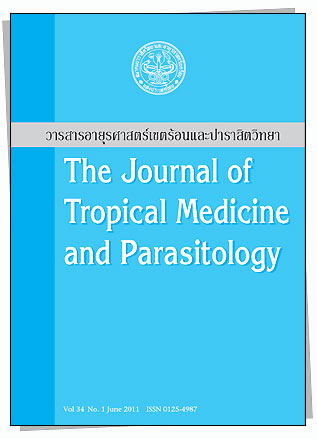Anti-Plasmodium falciparum IgG Antibody Responses and their Relation to Severity of Malaria among Thais
Main Article Content
Abstract
Abstract
Naturally acquired antibodies play a crucial role in the development of immunity to malaria. Overthe past two decades, anti-Plasmodium falciparum IgG antibodies against different malariacandidate antigens have been conducted in the sera of individuals living in eastern and westernThailand, where malaria is endemic, ie, individuals with severe and uncomplicated malaria, villageresidents, and occupationally exposed soldiers. The prevalence of anti-P. falciparum IgG antibody, andits relation to reported morbidity and mortality, was reviewed. Sero-activity for anti-IgG antibodies toerythrocyte membrane immunofluorescence (EMIF), Pf332, Pf155/ring-infected erythrocyte surfaceantigens (RESA), the repeat region of the circumsporozoite (CS) protein (R32tet32), and whole P.falciparum sporozoites, were observed in some, but not all, individuals. Interestingly, all villageresidents, all occupationally exposed soldiers, and all acute falciparum-malaria cases, had IgG antibodyresponses to late blood-stage (whole trophozoite and schizont) malaria antigens. Significantly loweredlevels of anti-late-blood-stage antibody were seen in patients who died from malaria, compared withthose who recovered. Similarly, significantly lowered levels of anti-P. falciparum sporozoite antibodieswere observed in cerebral malaria, compared with acute uncomplicated malaria. The exploration ofnaturally acquired anti-P. falciparum antibody responses in those reports may suggest that a successfulmalaria vaccine should contain multiple-stage antigens, such as whole P. falciparum sporozoite or wholeblood-stage antigen. This revelation may provide clues for malaria control, especially vaccinationstrategies.
Keywords: malaria, Plasmodium falciparum, antibody, IgG, vaccine

